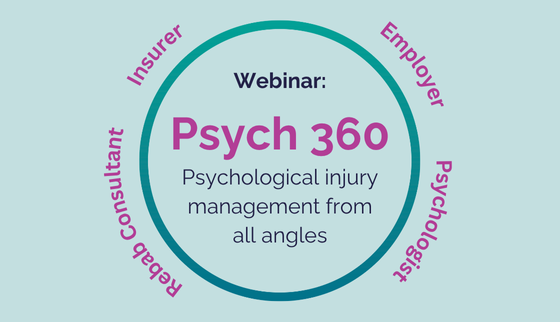When working with someone recovering from injury or in rehabilitation, there are a lot of aspects to the information given.
There’s the understanding and application of the most effective recovery processes and return to work practices, new technology, and, of course, the years of learning and expertise to deliver it effectively so the client has the best possible recovery and results.
But what we are understanding better, is how important the words we use as health professionals are in achieving positive client outcomes.
Language can change how we think about our health
Words are powerful.
We all know how, in our daily lives, what is said to us and what we read can make us feel good or bad about ourselves or what’s happening around us.
It’s the same in rehabilitation.
Language has the power to significantly impact consultant practice – good and bad.
Words are what we use to communicate with a client and steer them in their rehabilitation towards recovery.
Language is how we interpret the world and what we are experiencing.
It can change how a person thinks or feels about their injury, so the words we choose can help them get better or cause harm.
Language about injuries, tests, results, suitable duties, recovery outcomes and how a client can approach returning to work can cause worry and fear or give reassurance.
An example of how everyday clinical terms can cause someone worry or fear is ‘chronic pain’.
To a client, this doesn’t necessarily mean ‘ongoing pain’.
Instead, it can sound more like extreme pain, and perhaps something they will struggle with for the rest of their life and seriously affect their quality of life.
But we can use language to reframe the issue.
Instead of language being about trying to fix it, it becomes helping them manage the condition and move on with their lives.
So, ‘chronic pain’ becomes ‘pain that can be managed’ without dominating their lives and stopping them from doing the things they want to do and still getting what they want out of life.
Another more common example is instead of telling a client they have ‘negative test results’, tell them that ‘everything appears normal’.
And the use of a technically correct term, like ‘lordosis’, is probably completely unfamiliar.
The unknown can create more worry as people fear the worst.
It is much better to say, the ‘normal curve in your back’.
Finding the positives
In essence, recovery-focused language is about a consultant not focusing on the biomedical issues and taking a broader view of what the biomedical issue means to the client and their life.
It’s about helping them find a positive outcome in the situation.
Here are some words and terms to avoid, with some alternatives.
| Words and terms to avoid | Alternative suggestions |
|---|---|
| Chronic degenerative changes | Normal age changes |
| Negative test results | Everything appears normal |
| Instability | Needs more strength and control |
| Wear and tear | Normal age changes |
| Neurological | Nervous system |
| Don’t worry | Everything will be okay |
| Bone on bone | Narrowing/tightness |
| Tear | Pull |
| Damage | Reparable harm |
| Paresthesia | Altered sensations |
| Trapped nerve | Tight, but can be stretched |
| Lordosis | The normal curve in your back |
| Kyphosis | The normal curve in your back |
| Bulge/herniation | Bump/swelling |
| Disease | Condition |
| Effusion | Swelling |
| Chronic | It may persist, but you can overcome it |
| Diagnostics | X-ray or scan |
| You are going to have to live with this | You may need to make some adjustments |
It’s also how we write about our clients
It’s not just the way you speak to a person.
A recent mental health service delivery study showed that recovery-focused language in the clinical notes can also make a difference.
Recovery-oriented language is also person-centred, as it puts the individual at the centre of the service and reflects a positive regard for the person being spoken about.
This positive approach to a person’s wellbeing in the notes has a positive effect on a client’s outcomes, especially when you consider these notes can be used by a range of health professionals who may be collaborating as part of the recovery journey, such as physiotherapists, psychologists, occupational therapists, social workers, general practitioners and so on.
An example of this in mental health service delivery is using the person’s name rather than ‘the client/patient’ and focusing on a person’s strengths, skills and passion, rather than what is ‘wrong’ with them.
We all benefit
It’s not just the person who benefits from a recovery-focused approach.
International studies show that it also has significant economic advantages for the community.
An Irish study showed that people who received rehabilitation services in mental health were eight times more likely to remain in the community or live in less supported accommodation.
If language and words can change people’s mindset about their injuries or mental health and help recovery and rehabilitation to deliver more positive outcomes, then it’s something all health professionals need to consider and start putting into practice.
If you’d like to learn more, please contact one of the team at Acumen on 1300 436 432 or [email protected].
Sources
- Sticks and stones: the impact of language in musculoskeletal rehabilitation – Journal of Orthopaedic & Sports Physical Therapy
- Measuring recovery-oriented rehabilitation language in clinical documentation to enhance recovery-oriented practice – PubMed Central




